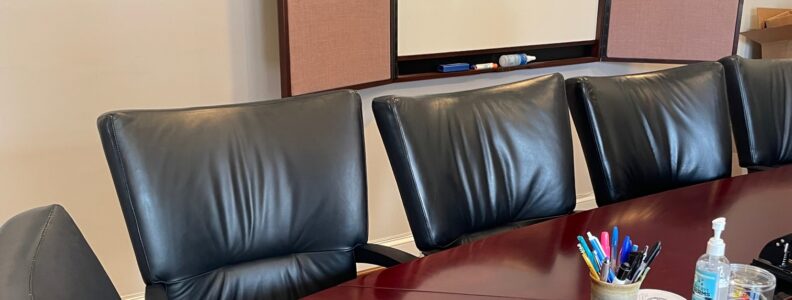
What to Expect at Depositions?
At your “Discovery Deposition” you will be asked questions under oath. A Court Reporter will be writing down every single thing you say, and an Insurance Defense Lawyer will ask a lot of really nosy questions! “It’s like an oral colonoscopy,” notes Herndon Injury Lawyer Doug Landau. Insurance Defense lawyers will ask about nearly every single aspect of your life, even if their private investigators have already done a “deep dive” and the Insurance Company has “indexed you.”
The 3 main questions you will be asked at the outset of a Works Compensation Hearing and at a Deposition are:
- 1. Who are you? Identify yourself by your legal name and address.
- 2. What is the nature of your claim? What body parts are you claiming were injured, or is it an occupational disease claim?
- 3. What are the dates of disability you are claiming? Is it a “closed period” claim, or is your time loss from work continuing, total, partial or some combination?
Most of the time, defense lawyers ask questions they already know the answers to – to test your honesty. They also want to see if your lawyer is prepared to go to court and if you give different stories to different people. They have already reviewed the accident reports, surveillance videos, taped statements to the adjusters, and other forms of evidence, prior to the Deposition. While questions may seem redundant, compliance is still necessary.
Depositions are a Discovery tool. The lawyers try to collect information to help their side : eliminate “surprises,” lock a witness or party into their specific version of the events, and “discover” other facts that may help reduce their exposure to have to pay for losses. It is important to know that not all of what’s asked will be used in trial. At a Deposition, the lawyers are allowed to ask about “relevant information.” But at a Deposition, they are also allowed to ask questions that “may lead to relevant evidence.”
The universe of questions they are permitted to ask at a Deposition is MUCH larger that what they would be allowed by a judge to ask at a trial or Hearing. Insurance Defense lawyer will ask a Deponent:
- 1. Where have you lived?
- 2. Where have you worked?
- 3. What doctors, hospitals & other health care providers have you seen?
- 4. Who do you live with?
- 5.Who have you discussed the case with?
- 6. What clubs do you belong to, churches do you attend, hobbies do you participate in, etc.?
- 7. What do you do when you are not at work?
Some Depositions can stretch for many hours or even days. Clients must be aware that any scheduled activity for that time may have to be pushed back, as you do not want to be sweating getting to a carpool or other appointment, as insurance defense lawyers have been known to drag the proceedings out when they learn of a witness’s time constraints.

Since the Covid pandemic, many depositions are done by Zoom or on other Internet platforms. Because the camera is focused solely on the person answering the questions, often a cell phone, the people at the other end participating in the deposition cannot see who else is in the room. If anyone else is present, they must be identified for the record. “Coaching,” scripts & teleprompter’s for witnesses being deposed are not allowed. If a person being deposed has notes, the lawyer interrogating them may ask to see them, make copies of them & cross-examine the witness about them. So, using written notes has to be thought through well in advance of the Deposition, because their use will usually lengthen the time needed for the opposing Insurance Company Lawyer’s under oath interrogation.
While ALL Depositions are before a Court Reporter, there are cases where a lawyer may want to preserve not only the written testimony, but video evidence of the Deposition. Sometimes videotape depositions are played at Trial in lieu of live testimony, with the witnesses outside of the jurisdiction of the court, and other times used to impeach a witness who is live at court. A videographer may also be present, so the witness’s wardrobe should be the same as if they were giving testimony in court. Clients should be timely for their arrival; rushing around just increases stress and the videographer and others participating may be charging hourly for their time.
While the ABRAMS LANDAU team tries to prepare ahead of time so as to avoid last minute questions or concerns, these do come up. You do not want to be delaying the Deposition because you failed to address some important item prior to the date of this Examination Under Oath (Depositions are sometimes called “EBTS” in other jurisdictions). All too often, attorney Doug Landau has seen lawyers preparing their clients just moments before their deposition, which gives no time for reflection, true preparation or follow up.
The basic “rules” for a Deposition are simple.
- 1. Tell the truth. A Deposition is taken under oath (and penalty of perjury). Lying under oath can get someone in trouble, as lying under oath is a felony. And, as any of Doug Landau’s Rachel Carson Middle School Constitutional Law & Civics students know, a felony is punishable by more than a year in jail, which is no fun!
- 2. If you do not hear a question, or do not understand the question, say so! It is permissible in a Deposition, just like in a courtroom, to ask the person doing the interrogation to “please rephrase the question,” or “please repeat the question,” or state, “I did not understand what you said, could you put it another way?”. Someone testifying should not guess what they think the question is if they don’t hear it or understand it, and they should not volunteer or start answering before the questioner has finished the question. Sometimes, the question is put so badly, that the lawyer on your side will object, and you will not have to say anything. Other times, the person asking the questions will realize that it was stated so poorly, that they will “withdraw the question” entirely or rephrase it to make it more comprehensible.
- 3. Keep it short and simple. Known as the “KISS rule” too many people think that they can win their case at a deposition. There is no judge or a deposition and no one is going to rule in your favor or write a check with your name on it. However, Doug Landau cautions – “you can certainly lose your case at a Deposition under oath.” Too many times, he has seen people so anxious to finally get to tell their side of the story, that they get “verbal diarrhea” and say all kinds of things that are irrelevant to the case, and simply serve to help the insurance company. “You should answer the question, and only the question asked,“ notes Landau. “The longer you talk, the more money the court reporter gets a charge for each page of transcript, and the more time the videographer gets to bill for recording the proceedings. Plus, the insurance defense lawyer is being paid hourly, so the more you talk, the more money those people make. The transcript will be really long and thick. And YOU will have paid for it! It will be almost impossible to say things exactly the same way at trial or your hearing as you did in the Deposition under oath. There are limited questions that should draw out long answers, like how do you feel, how did you feel at the time of the incident, and tell us about all the harms you think you have sustained.” IF more information is needed, your lawyer has the opportunity to ask questions at the end of the Deposition. Often, Doug Landau will not do so, and save his questions for Trial, where he will draw out other details. That is because if any questions are asked of the witness or the claimant, the insurance defense lawyer gets to go another round.
At the end of the Deposition, the court reporter will usually ask the witness if they want to “waive reading and signing?“ What this means in English is a person being deposed has the right to look at the transcript after it is typed up, make corrections on a “Errata sheet“ sign it, and be “locked in.” Experienced injury attorney Doug Landau will routinely “waive reading and signing” for his clients and witnesses, because of the hassle of getting with the court reporter to go through it, the very remote likelihood of finding any major errors. That is because the court reporter types everything out as it’s being said, AND they also record on a digital recorder AND other devices. And, when a Depositions is by video, there is even a tertiary back up in the form of the digital recording. In other words, lawyer Landau feels that between the video, the digital, stenography, etc., they pretty much got it just right, as they even ask for spellings as they go along and during breaks. Only in cases where there’s a lot of technical language, or a very thick accent, does it seem to make sense to have reading and signing at a later date.
The Discovery period allows both sides to discover information before trial, Mediation, Arbitration or a Hearing, even if you have gone over most of it beforehand. It is a tool used to learn information, see evidence and “lock in” a witness to their story of what happened. If you, or someone you care for, has any questions regarding an injury case, what the insurance company is allowed to ask you or require that you provide, or needs assistance please contact us at frontdesk@landaulawshop.com or call (703) 796-9555.
